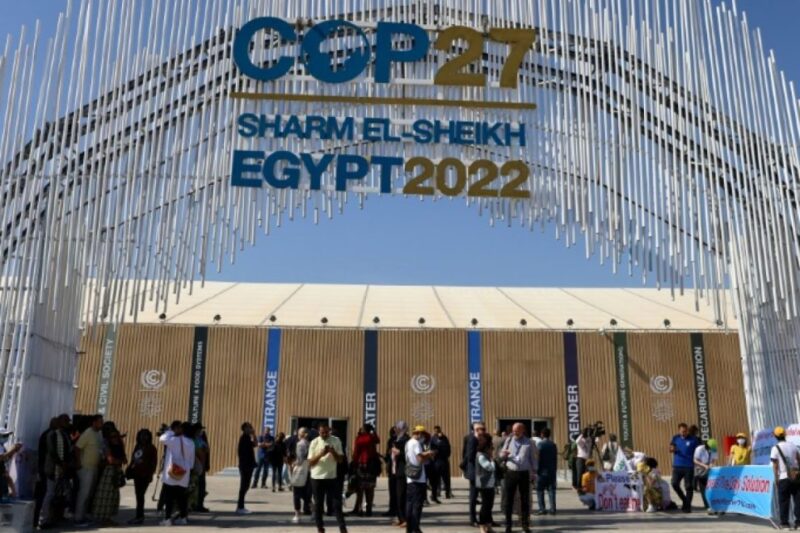African leaders have been urged to push for support for the continuance and sustainable implementation of the Great Green Wall initiative – especially in the Sahel and Lake Chad Basin regions – at the COP27 summit being held in Egypt.
The Great Green Wall (GGW) initiative, which was launched in 2007 by the African Union (AU), is regarded as a game-changing African-led project aimed at restoring the continent’s degraded landscapes and transforming millions of lives in the Sahel and Lake Chad Basin regions by 2030.
The project has evolved from its initial focus of planting millions of trees towards a comprehensive rural development initiative that aims to transform the lives of those living in the Sahel by creating a mosaic of green and productive landscapes across 11 countries – Burkina Faso, Chad, Djibouti, Eritrea, Ethiopia, Mali, Mauritania, Niger, Nigeria, Senegal and Sudan.
RNI spoke to Mustapha Adam Kolo, a senior lecturer at the geography department of the University of Maiduguri, to find out the progress made so far towards the actualisation of the GGW initiative by 2030, only eight years away.
Kolo said: “The United Nations Conference of Parties [COP] is a summit on climate change. This year it is being held on African soil in Sharm el-Sheikh, Egypt. It started on November 6 and ends on November 18.
“Climate change is an issue all over the world, ranging from floods caused by melting glaciers in the polar region to the rise in sea levels in the Atlantic Ocean. At present there are devastating floods in Pakistan. Some parts of the world are experiencing exceedingly high or very low temperatures. There have also been some devastating wildfires, as well as droughts and heavy rainfall in some parts of the world. This is an indication that climate change has affected every country. For that reason, at the COP27 summit, leaders and environmental experts need to start implementing the commitments they made to curb climate change.”
Kolo said African leaders needed to push for support at the COP27 summit to enable the sustainable implementation of the GGW project for the betterment of all the continent’s people, especially those in the Sahel and Lake Chad Basin regions.
The GGW initiative aimed to establish massive plantations of trees in desert areas, he said. The project covered the Sahel region from Senegal in the west to Djibouti in the east. Several milestones had been reached across the continent, with some countries being more successful than others.
“While some countries started implementing the initiative’s activities as early as 2008, others joined only in 2014, when the declaration was ratified.
“The total area of the GGW initiative in the Sahel area extends over 156 million hectares, with the largest areas in Niger, Mali, Ethiopia and Eritrea.”
Kolo said that since its launch in 2007, much progress had been made in restoring the fertility of Sahelian lands by planting trees and diversifying agricultural activities. The Nigerian government had also started partial implementation of the GGW initiative in Borno State in the northeast.
“Sometimes on my way to Damasak in the Mobbar Local Government Area of Borno State, I have seen different varieties of seeds being distributed for plantations. Also, there is a place along Maiduguri-Damaturu road where trees have been planted. Boreholes have been dug to water the trees.”
Kolo said that without proper funding the GGW project would not accelerate and it needed the total commitment of African leaders, who should be encouraged to take climate change seriously and have the political will to ensure all measures were implemented.
“I urge African leaders to show their efforts and full strength in the fight against climate change by implementing the GGW project which encompasses the mass plantation of trees, rural development, as well as diversification of agricultural activities on the continent, with a special focus on the Sahel and Lake Chad Basin regions.
“It’s high time African leaders focused on the GGW project and established policies and laws that will stop the mass felling of trees and introduce alternative sources of energy for households, such as subsidised gas for cooking so that the need for firewood and charcoal will diminish. Niger has already started doing this.
“The felling of trees, particularly, needs to be stopped to help curb climate change on the continent. It’s imperative for African leaders to join hands and collectively stand firm to ensure the implementation and actualisation of the GGW initiative because it’s one of the main measures to combat climate change across the African continent.”
The United Nations Convention to Combat Desertification said the objective of the GGW was to restore millions of hectares of degraded land, sequester millions of tons of carbon and create millions of green jobs by 2030.
It would restore one of humanity’s most precious natural assets: fertile land; produce economic opportunities for the world’s youngest population; provide food security for the millions who went hungry every day; and create climate resilience in regions where temperatures were rising faster than anywhere else on earth.
SHETTIMA LAWAN MONGUNO









